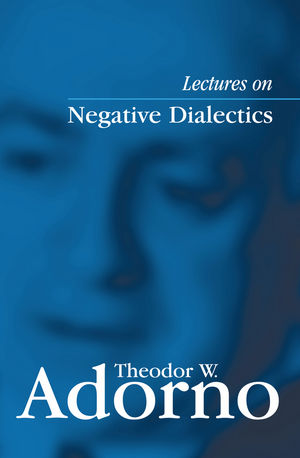Lectures on Negative Dialectics: Fragments of a Lecture Course 1965/1966ISBN: 978-0-7456-3510-1
Paperback
352 pages
September 2008, Polity
 This is a Print-on-Demand title. It will be printed specifically to fill your order. Please allow an additional 10-15 days delivery time. The book is not returnable.
Other Available Formats: Hardcover
|
||||||
This volume comprises one of the key lecture courses leading up to
the publication in 1966 of Adorno's major work, Negative
Dialectics. These lectures focus on developing the concepts
critical to the introductory section of that book. They show Adorno
as an embattled philosopher defining his own methodology among the
prevailing trends of the time. As a critical theorist, he
repudiated the worn-out Marxist stereotypes still dominant in the
Soviet bloc – he specifically addresses his remarks to
students who had escaped from the East in the period leading up to
the building of the Berlin Wall in 1961. Influenced as he was by
the empirical schools of thought he had encountered in the United
States, he nevertheless continued to resist what he saw as their
surrender to scientific and mathematical abstraction. However,
their influence was potent enough to prevent him from reverting to
the traditional idealisms still prevalent in Germany, or to their
latest manifestations in the shape of the new ontology of Heidegger
and his disciples. Instead, he attempts to define, perhaps more
simply and fully than in the final published version, a
‘negative', i.e. critical, approach to philosophy. Permeating
the whole book is Adorno’s sense of the overwhelming power of
totalizing, dominating systems in the post-Auschwitz world.
Intellectual negativity, therefore, commits him to the stubborn
defence of individuals – both facts and people – who
stubbornly refuse to become integrated into ‘the administered
world’.
These lectures reveal Adorno to be a lively and engaging lecturer. He makes serious demands on his listeners but always manages to enliven his arguments with observations on philosophers and writers such as Proust and Brecht and comments on current events. Heavy intellectual artillery is combined with a concern for his students’ progress.



